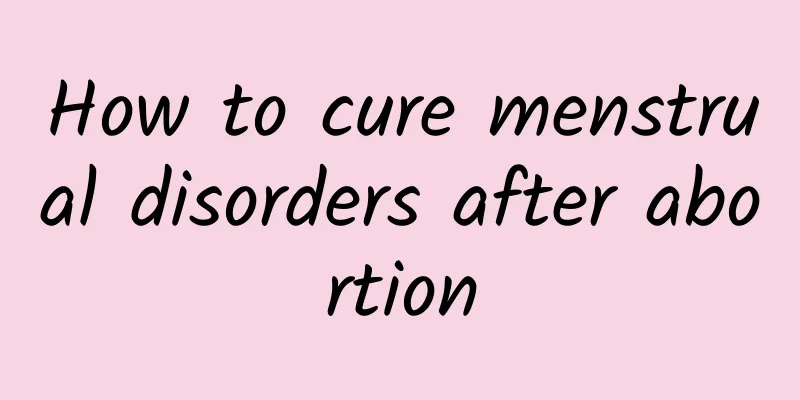How to cure menstrual disorders after abortion

|
How to cure menstrual disorders after abortion? Some women are in a bad mood for a long time due to great psychological pressure after abortion, which may affect the endocrine system and then affect menstruation, resulting in menstrual disorders. So, how to cure menstrual disorders after abortion? Let's take a look at the specific introduction. Menstrual disorders are common complications after abortion. As long as you pay attention to conditioning, you can recover. The time it takes to recover from abortion varies greatly from person to person. Most women will have a menstrual cycle about one month after surgery or the same as before, and the amount of blood in the menstrual cycle is the same as the original menstrual cycle or slightly more than the menstrual cycle. A small number of women may have their menstrual cycle function affected by artificial abortion. If a woman's menstruation has not come for a long time after an abortion, or she has obvious dysmenorrhea, reduced menstrual flow, or abnormal menstrual blood color, she should go to the hospital for examination in time to confirm the cause and receive symptomatic treatment to avoid affecting her future fertility. After artificial abortion, the ovaries can generally resume ovulation within 22 days, and menstruation will occur in about 1 month. However, a few women experience menstrual disorders such as prolonged menstruation, irregular cycles, and amenorrhea after artificial abortion. This situation generally returns to normal after 2-3 months, and a few people last longer. The menstrual situation after artificial abortion also varies according to the number of days of pregnancy and individual physical constitution. Women with menstrual disorders after miscarriage should adjust their diet and take good rest. Sexual intercourse is prohibited during the first month of confinement, and vaginal hygiene should be maintained. They should consume more calcium-rich foods such as milk and dried fish. Coffee, tea and other beverages will increase anxiety and restlessness. Vegetables, fruits, whole grains, whole wheat bread, brown rice, oats and other foods contain more fiber, which can promote the discharge of estrogen, increase the magnesium content in the blood, and have the effect of regulating menstruation and calming nerves. |
<<: How to cure post-abortion infection
>>: Can menstrual disorders after abortion be cured?
Recommend
Why do women get uterine fibroids? What are the causes of uterine fibroids?
1. Causes of uterine fibroids: The cause of uteri...
How long after an abortion can I go out? See what the doctor says
Pregnancy is a lucky and beautiful thing, but it ...
What can I take to replenish Qi and blood if I have uterine fibroids? What medicine can I take to replenish Qi and blood if I have uterine fibroids?
Uterine fibroids are a common gynecological disea...
Experts briefly analyze the characteristics of ultrasound interventional treatment of ovarian cysts
Ultrasound intervention is a popular method for t...
What are the dietary taboos for threatened abortion? Don't eat these 4 types of food
Many women experience threatened miscarriage in t...
Postpartum vulvar itching and abnormal vaginal discharge
If you experience vulvar itching and abnormal vag...
Overcome your weight loss plateau! Supplement protein in moderation
I believe that friends who have experience in wei...
Is irregular menstruation harmful to women? What are the causes of irregular menstruation in women?
Menstrual irregularities in women are very common...
What are the symptoms of acute ectopic pregnancy?
Ectopic pregnancy, also known as tubal pregnancy,...
The first menstrual period after miscarriage is very important
After a miscarriage, the female body needs to go ...
Parent-child skipping rope sets a record! Burn fat, relieve stress and strengthen the brain
Turning off their computers and mobile phones, mo...
What medicine is used to treat uterine cysts
For uterine cysts, some people do not receive sur...
What are the symptoms of submucous uterine fibroids?
What are the symptoms of submucous uterine fibroi...
Don’t stigmatize fat! Eating smart can help reduce inflammation and help lose weight
Fat, fiber, and protein, with a little spice on t...
Why do uterine fibroids sometimes disappear suddenly?
Why do uterine fibroids sometimes not appear? Ute...









